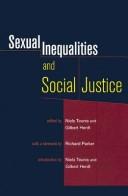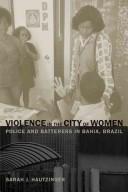| Listing 1 - 4 of 4 |
Sort by
|
Book
ISBN: 9781137409621 Year: 2014 Publisher: New York, NY Palgrave Macmillan
Abstract | Keywords | Export | Availability | Bookmark
 Loading...
Loading...Choose an application
- Reference Manager
- EndNote
- RefWorks (Direct export to RefWorks)
Sex --- Sexualité --- Religious aspects. --- Aspect religieux --- sexuality and new religious movements --- gender --- women's empowerment in Mormon fundamentalist communities --- the Branch Davidians --- sex and gender --- Osho --- Bhagwan Shree Rajneesh --- sexual practice --- spiritual awakening --- divine self-realization --- the Reality-Way of Adidam --- Gurdjieff --- Si 12 --- sex magic --- sacred marriage --- sexuality in contemporary Wicca --- eroticism --- gender in contemporary Satanism --- Raël's Angels --- abuse and captivity in nineteenth-century convent tales

ISBN: 9780520246157 9780520246140 0520246152 1433701367 9781433701368 9780520939141 052093914X 128277199X 9781282771994 0520246144 9786612771996 Year: 2007 Publisher: Berkeley University of California Press
Abstract | Keywords | Export | Availability | Bookmark
 Loading...
Loading...Choose an application
- Reference Manager
- EndNote
- RefWorks (Direct export to RefWorks)
This pioneering collection of ten ethnographically rich essays signals the emergence of a new paradigm of social analysis committed to understanding and analyzing social oppression in the context of sexuality and gender. The contributors, an interdisciplinary group of social scientists representing anthropology, sociology, public health, and psychology, illuminate the role of sexuality in producing and reproducing inequality, difference, and structural violence among a range of populations in various geographic, historical, and cultural arenas. In particular, the essays consider racial minorities including Hispanics, Koreans, and African Americans; discuss disabled people; examine issues including substance abuse, sexual coercion, and HIV/AIDS; and delve into other topics including religion and politics. Rather than emphasizing sexuality as an individual trait, the essays view it as a social phenomenon, focusing in particular on cultural meaning and real-world processes of inequality such as racism and homophobia. The authors address the complex and challenging question of how the research under discussion here can make a real contribution to the struggle for social justice.
Sex. --- Equality. --- Social justice. --- Social action. --- Ethnicity. --- Sexualité --- Egalité (Sociologie) --- Justice sociale --- Action sociale --- Ethnicité --- Gender. --- Gender (Sex) --- Human beings --- Human sexuality --- Sex (Gender) --- Sexual behavior --- Sexual practices --- Sexuality --- Sexology --- Equality --- Justice --- Ethnic identity --- Group identity --- Cultural fusion --- Multiculturalism --- Cultural pluralism --- Social policy --- Social problems --- Egalitarianism --- Inequality --- Social equality --- Social inequality --- Political science --- Sociology --- Democracy --- Liberty --- african americans. --- anthropology. --- cultural history. --- essay collection. --- ethnographers. --- ethnographic studies. --- gender studies. --- hispanic experience. --- historical perspective. --- hiv aids. --- interdisciplinary perspective. --- koreans. --- nonfiction essays. --- psychology. --- public health. --- racial minorities. --- sex and gender. --- sexual coercion. --- sexual health. --- sexual inequality. --- sexuality. --- social analysis. --- social justice. --- social oppression. --- social science. --- social scientists. --- sociology. --- structural violence. --- substance abuse.

ISBN: 1282772260 9786612772269 0520941152 1435611438 9780520941151 9781435611436 9780520252769 0520252764 9780520252776 0520252772 1433708965 9781433708961 Year: 2007 Publisher: Berkeley, CA : University of California Press,
Abstract | Keywords | Export | Availability | Bookmark
 Loading...
Loading...Choose an application
- Reference Manager
- EndNote
- RefWorks (Direct export to RefWorks)
Brazil's innovative all-female police stations, installed as part of the return to civilian rule in the 1980s, mark the country's first effort to police domestic violence against women. Sarah J. Hautzinger's vividly detailed, accessibly written study explores this phenomenon as a window onto the shifting relationship between violence and gendered power struggles in the city of Salvador da Bahia. Hautzinger brings together distinct voices-unexpectedly macho policewomen, the battered women they are charged with defending, indomitable Bahian women who disdain female victims, and men who grapple with changing pressures related to masculinity and honor. What emerges is a view of Brazil's policing experiment as a pioneering, and potentially radical, response to demands of the women's movement to build feminism into the state in a society fundamentally shaped by gender.
Sex role --- Masculinity --- Family violence --- Policewomen --- Women --- Masculinity (Psychology) --- Sex (Psychology) --- Men --- Gender role --- Sex differences (Psychology) --- Social role --- Gender expression --- Sexism --- Domestic violence --- Household violence --- Interparental violence --- Intrafamily violence --- Violence --- Female police officers --- Police women --- Women police officers --- Police --- Human females --- Wimmin --- Woman --- Womon --- Womyn --- Females --- Human beings --- Femininity --- Femmes --- Policières --- Violence familiale --- Masculinité --- Rôle selon le sexe --- Gender roles --- Gendered role --- Gendered roles --- Role, Gender --- Role, Gendered --- Role, Sex --- Roles, Gender --- Roles, Gendered --- Roles, Sex --- Sex roles --- all female police stations. --- anthropology. --- battered women. --- brazil. --- brazilian culture. --- brazilian history. --- civilian rule. --- domestic violence. --- ethnography. --- female victims. --- feminism. --- gender based violence. --- gender studies. --- gendered power struggles. --- gendered violence. --- in laws. --- masculinity. --- men and women. --- police officers. --- police station. --- police. --- policewomen. --- policing by women. --- policing experiment. --- policing for women. --- salvador de bahia. --- sex and gender. --- social structures. --- violence against women. --- violence. --- women police. --- womens movement.
Book
Year: 2021 Publisher: Basel, Switzerland MDPI - Multidisciplinary Digital Publishing Institute
Abstract | Keywords | Export | Availability | Bookmark
 Loading...
Loading...Choose an application
- Reference Manager
- EndNote
- RefWorks (Direct export to RefWorks)
“Sex, Gender and Substance Use” describes how both biological and social factors affect people's use of substances. There is a lot of research carried out on substance use, prevention and treatment in which sex and gender are missing. This book describes the concepts of sex and gender, what they mean and why including them in substance use research, practice and policy is vital. Substances such as alcohol, drugs, nicotine, and tobacco all have differential effects on females and males. Social and cultural gendered factors affect how women and men react to prevention, treatment and policies. The book includes numerous examples of how sex- and gender-sensitive research can increase our understanding and improve prevention and treatment, and why striving for gender-transformative substance use practice and research remains a gold standard.
Humanities --- Social interaction --- alcohol --- pregnancy --- abortion --- policy --- gender --- substance use --- FASD prevention --- program evaluation --- multi-service program delivery --- client perspectives --- interpersonal violence --- domestic violence --- intervention --- women --- developmental–relational --- gender-specific approach --- non-medical prescription opioid use --- sleep disturbance --- sex differences --- adolescents --- sexual minorities --- illegal substance use --- homophobic bullying --- alcohol’s harms to others --- gender equality --- drinking cultures --- developmental-relational --- electronic cigarettes --- cigarettes --- waterpipe --- hookah --- polytobacco use --- young adults --- sex --- cognitions --- attitudes --- scoping review --- barriers --- facilitators --- fathers --- males --- smoking --- smoke-free home --- second-hand smoke --- brief intervention --- college campus --- gender transformative --- gender equity --- cannabis --- sex- and gender-based analysis --- SGBA --- cannabis use disorder --- randomized controlled trial --- gender norms --- gender roles --- gender relations --- technology --- health promotion --- SGBA+ --- substance use prevention --- tobacco --- smoking cessation --- clinical decision support systems --- prevention --- alcohol consumption --- FASD --- lifestyle --- public health --- Spain --- sex factors --- substance abuse --- drinking --- nicotine --- research
| Listing 1 - 4 of 4 |
Sort by
|

 Search
Search Feedback
Feedback About UniCat
About UniCat  Help
Help News
News